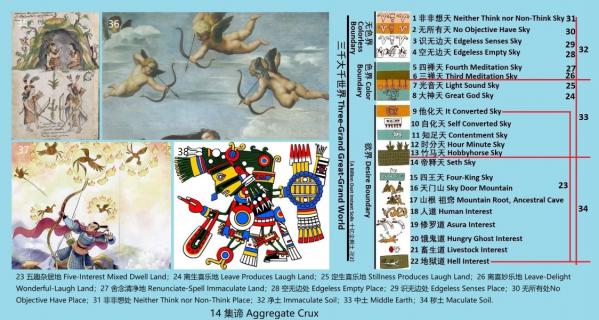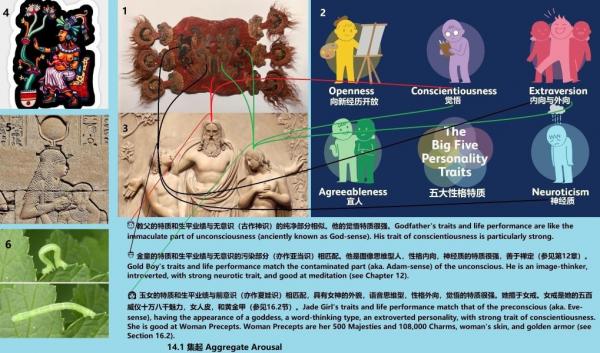目录 Catalog:14.1 集起 Aggregate Arousal;14.2 烦恼的名 Names of Annoyances;14.3 烦恼的数 Numbers of Annoyances 集谛,亦有彤弓素矢(如图14-35至38)、爱经、业经等异名,谈苦谛中苦的因是集。素矢是说贪嗔痴烦恼如同三支箭(如图36),能射伤众生。贪是八万四千烦恼(参见14.3节)之首,是爱法的第一分(相分;参见11.1节),所以集谛又被称作爱经。集谛总列了大千世界(如图14-1至24)中的全部烦恼,都是业,所以集谛又被称作业经。业是身口意三业。身业是身体行为习气的积聚,此身即是;口业是语言习气的积累,此口说的就是;意业是思想行为习气的累积,此心所想的就是。业亦作身土,如图35上部所示。图23至31所示的九地,即生命之树的树干,也是身土义。 Aggregate Crux, also known as Eros (as shown in Figures 14-35 to 38), Love Sutra, Karma Sutra, talks about the causes of bitter in Bitter Crux (Cf. Chapter 13). Eros refer to the three arrows of greed, irritability and ignorance (see Figure 36), which can hurt sentient beings. Greed is the first of the 84,000 annoyances (see Section 14.3) and the first juristic quadrant of Love (the phenomenal quadrant; see Section 11.1), so the Aggregate Crux is also called the Love Sutra. The Collective Meaning summarizes all the troubles in the Great Grand Worlds (as shown in Figures 14-1 through 24), all of which are karma, so the Collective Meaning is also called the Karma Sutra. Karma means the three karmas of body, mouth, and intent. Body karma is the accumulation of physical behavioral habits, that is this flesh body. Oral karma is the accumulation of oral habits, that is this mouth speaking. Intentional karma is the accumulation of thinking habits, which is the mind thinkings. Karma is also the bodily soil, as shown in the upper part of Figure 35. The nine lands shown in Figures 23 to 31, which are the trunk of the tree of life, also mean the bodily soil.

14.1 集起 Aggregate Arousal集是心的功能,是收集,集合义,有三义:能集、所集、集起。能集是说心能收集诸法的种子。诸法的种子如第11章生命之树中的百法。所集是说心即是那些收集来的种子。集起即心能发起被蕴育成熟的种子,使之现行。本小节先说一个集起的事例,然后谈集起的四个必要因素,即四缘。 Aggregate means gathering, collection, is heart’s function, has three significances: able to collect, the being collected, and aggregate arousal. “Able to Aggregate”, means that heart is capable and continually collect all juristic seeds. What are juristic seeds? Such as the 100 laws in chapter 11 Tree of Life. “The being aggregated” means heart is those gathered seeds. “Aggregate Arousal” means that heart can arouse matured seeds into performances. This subsection first talks about an example of Aggregate Arousal, then talks about its four necessary factors. 14.1.1 尘刹土 Dust Instant Soil下段文字说的是纯幻觉状态,即独影境(参见11.4.5-3和12.1节);从没有身土开始,即从没有思想意识和身体的感觉开始。 昏暗中,微弱朦胧的小我(注1)望见前面有个类似株杌(注2)的东西,心想:那是什么?好像是棵枯死了的树!?(注3;瞬间转移。)小我站在了山坡上枯树桩的近前。环境变亮了(注4),在山坡上的小我看清楚了,那东西确实是(注5)棵枯树。小我想:这是什么地方?四处张望。(此尘刹土世界随我所望而生长广大。)小我意识到了自己在一个山坡上。环境变得越来越清晰,风吹枯草,波浪荡漾,天上还有已经腐朽了的死鸟在飞。我望见远处有个破房子,那是什么地方?(注6,瞬间转移)小我到了房子的附近,看清楚了,这是座庙。庙的建筑变得越来越清晰;光照度由昏暗而变亮。庙门是关着的,里面什么样?(注7,瞬间转移)我进了庙里,庙门自动地关闭了(注8,瞬间转移),里面一片漆黑。 The next text speaks of pure hallucination state, that is “solitary-head environment” (cf. section 11.4.5-3, and 12.1); starts without “bodily soil”, that is without bodily senses or feelings. In the dimness, faint and hazy little-me (note 1) saw a stump like thing afar (2), thought: “what is that? Looks like a weathered tree stump!? (3; while little-me is watching, teleportation happens.)” Little-me stood near the dead tree stump on the hillside. At the same time, the environment became brighter (4). Little-I on the hillside saw clearly that it is (5) a dead tree indeed, thought, “what is this place?” Looked around. (This Dust-Instant-Soil world grows as little-me wish.) Little-I realized that I am on a hillside. The environment became clearer and clearer, the wind was blowing dry grasses, like waves were rippling, and there were rotten dead birds flying in the sky. Little-I saw a ruined house in the distance, thought: “what is that?” (6, teleportation, I came near the house.) I can see clearly; this is a temple. (The building of the temple becomes more and more clear; the light intensity was changing from dim to bright). Little-I looked around. (The surrounding environment of the temple is in the process of being formed; the light intensity changes from dim to bright). The door of the temple is closed; I thought: “what is it like inside?” (7, teleportation, I entered the temple.) The temple door closed automatically (8, teleportation), and I was in complete darkness.

注1,此“昏暗”即是“无明”,愚钝无知义。此中的光是内明,具有自证功能,即是觉悟之光。前意识,英语世界称作夏娃识,总是执着些前面枯萎了的念头,于是就在夏娃识执着的事物上具有了微弱的自我的功能。此 “小我” 是人思想内部的随念自我,汉语作福,亦作大力神,佛教称儒童(摩纳婆),印度教称婆罗门,墨西哥沙门教称灵龙(如图14.1-4中的婴儿),伊斯兰教、基督教、和古埃及文化称亚伯(如图14.1-5中的孩子),日耳曼文化中作马格尼,。 Note 1: This "dimness" is "non-light", the meaning of stupidity and ignorance. The light in this case is internal light, which has the function of self-evidence, i.e., the light of enlightenment. Pre-consciousness, which the English-speaking world calls Eve-sense, always clings to the former thoughts that have withered, and thus has a weak self-function in the things that Eve-sense clings to. The “little me” is human along thoughts ego inside mind, Chinese as Fortune, also call as Great Strength God, Hindus as Brahmin, ancient Mexican as Quetzalcoatl (the baby in fig. 14.1-4), Islam Christian and ancient Egyptian as Abel (the child in fig. 14.1-5), Germanic culture as Magni. 前意识(即夏娃识)的行为很像一只步屈虫(如插图6),它的后脚总是抓着些东西,张望、寻找去处;前脚抓稳后,后脚跟进。夏娃识也这样,总是抓住些什么,而被抓的事物就有了质量或生命,此执着处的光就有“小我”的功能。所以古埃及和古墨西哥人就用抱着孩子(即亚伯)喂奶来表示那个女人是夏娃。夏娃识是此;亚当识(即无意识的污染部分)是彼,是客观对象,是客观环境,没有生命迹象。神识(即无意识的纯净部分)是常,无名、无数、无量。前意识是思想意识的工作平台,是意处,总是不断更新,转移场地,后面就留下了绵长的亚伯痕迹,就是转移身见(参见11.4.4.1.4.6-1)。转移如案例中标注点3、6、7、和8,都是场景转换。转移身见就是日常口语中的我,梵语中作萨迦耶见,英语中称作塞斯,古德语位爱色,纳瓦特语是提拉考安,道教中称作蚩尤。 The behaviors of preconsciousness (i.e., Eve-sense) is very similar to that of an inchworm (as shown in fig. 6). Inchworm’s hind feet always grab something, after the front feet are firmly grasped, the back feet follow. Eve-sense is like that, always grasping something, and which faded former thing has the function of “along thoughts ego”. Therefore, the ancient Egyptians and Mexicans used to hold or breastfeed Abel to indicate that the woman is Eve. Eve-sense is here, this place, the subjective; Adam-sense (i.e., the contaminated part of unconsciousness) is there, that place, the objectives, the objective environment, with no sign of life. God-sense (i.e., immaculate part of unconsciousness) is constant, nameless, innumerable, and quantity-less. Preconsciousness is mind’s ever updating working platform, is intent-place, leaving a long trace of faded Abels behind, which is “Translocation Body Views” (cf. section 11.4.4.1.4.6-1). Translocation as in the case labeled points 3, 6, 7, and 8 are scene transitions. “Translocation Body View” is what we call "I" in daily spoken language, called “sakkāya-diṭṭh” in Sanskrit, "Seth" in English, "Æsir" (I-sir) in Old German, "Titlacauan" in Nahuatl, and "Chiyou" in Taoism. 注2,株杌即枯树桩,是一个异熟果(参见11.6.1 异熟果)。 注3,瞬间转移,这是场景瞬间变化,就如同我瞬间从昏暗处来到了山坡上的枯树桩旁边,类似案例参见12.1.7天腿通。此后的注6,注7,和注8也是这样的道理。 注4,环境变亮了,就是觉悟了。此亮光是内明,与注1的昏暗、无明相对。此亮光有自证功能,即有法四分中的第三分自证分的功能(参见11.1 法的四分)。 注5,是,古作系,认知义;结合上下文,“是” 是 “系缚结生” 义。 注8,漆黑义为无明,即我又陷入了本案例开始的状态。 Note 2, the Stump is a mutant fruit (cf. section 11.6.1), belongs to Adam-sense. Note 3, instant translocation or teleportation a is instant scenery change, just as I instantly went from the darkness to the side of the dead tree stump on the hillside, (cf. section 12.1.7). The same is true of subsequent annotation 7, 8, and 9. Note 4, what the environment becomes brighter, is enlightenment. This bright light is inner light, as opposed to the dim and unbright in annotation 1. This bright light has a Self-Evidence function, that is the function of the third quadrant of the Four Juristic Quadrants (see section 11.1 Juristic Quadrants) Note 5, Is, is cognition; combined with the context, “Is” is the meaning of “tether, tethering life”. Note 8, the darkness is “non-light”, is ignorance. That is, I was stuck again in the state where this case started. 14.1.2 四缘 Four Necessary Elements集起有四个必要元素:能缘缘,所缘缘,等无间缘,和增上缘。 (一)能缘缘是是主观的核心,集起的原因。圣人说夏娃识(即前意识)与亚当识(即无意识的污染部分)辗转相望为因缘(如图1)。也可以理解为 “能做因” (参见11.6.3 士用果),此 “能” 就是前文尘刹土案例中的随念自我,亚伯。与此相对应,图1中也显示了山羊睚眦和磨牙(即亚当和夏娃,参见10.9节《上帝的三和合》)的相望是他们俩婚姻的原因。 (二)所缘缘,就是客观目标,有两种,亲所缘缘和疏所缘缘。什么是亲所缘缘?如上文事例的环境,是由内虑生出并支持的,没有能缘心,那个尘刹土世界会消失。什么是疏所缘缘?若与能缘心虽相离,为质能起内所虑托,应知彼是疏所缘缘。 There are four necessary elements to Aggregate Arousal: the able to aggregate, the being aggregated, the equally unintermittent, the escalatory. (1) The Able to Aggregate is the core part of the subjective, is the cause of the Aggregate Arousal. Sage said that Eve-sense (that is preconsciousness) and Adam-sense (that is maculate part of unconsciousness) watching each other directly or through medias is the cause. It can also be understood as “ABLE as reason” (see 11.6.3 Warrior Usage Fruit). This ABLE is the along thoughts ego, Abel, in the previous example of “Dust Instant Soil”. Correspondingly, Figure 1 also shows that the watch between the goats Tangnjóstr and Tanngrisnir (Adam and Eve, cf. section 10.9 Godly Trinity) is the reason for their marriage. (2) The Being Aggregated, which is the objective, is of two kinds, Relative Objective and Stranger Objective. What is the Relative Objective? The environment, such as in the example above, is generated and supported by internal considerations, and without the internal considerations, that world of Dust Instant Soil would disappear. What is the Stranger Objective? If, although separate from the capable mind, that objective with the quality can generate and supporting the internal considerations, one should know that it is the Stranger Objective. (三)等无间缘,八现识及彼心所有法(参见11.4.5 识蕴)后聚于前,自类无间,等而开导,令彼定生。如上文的事例,想取来相,思辨别善恶美丑,夏娃识迅速赋予了临近事务以生机,它们相应而转,和合似一,把一个枯树桩生长成了一个尘刹土世界。所以,它们彼此互为等无间缘。等无间缘即是生命之树的等流果(参见11.6.2节)。 (四)增上缘,例如有法有胜势功能,能于它法或顺或违或不障。虽前三缘也有增上用,此处说第四缘除彼取余,为显四缘差别相故。增上缘很多,但于中胜显者唯二十二根(参见11.6.5 增上果)。那为什么此增上缘是集起的必要因素?日常生活中的集起必须俱全生命之树的六生长处。前文案例是定境,是纯思想意识状态,是幻觉状态。若现实生活中的集起缺六处中的某一处,比如身处有缺失,那这个人就可能在光天化日之下,发现地球的引力变小了,太阳的亮度降低了,和月亮一样,不刺眼。若身处再进一步缺失,就可能发现自己的牛突然具有了印度香象的超能力,会飞了;随后美国人常遇到的外星人绑架事件就可能再一次发生。 (3) Equally Unintermittent, the eight present senses and their heartland laws (see section 11.4.5 Sense Node), the later follow the front, self-classes are uninterruptedly and equitably succeeding, to have the Objective is born certainly. As in the above example, “think” fetches phenomena, “mean” distinguishes benevolence ferocity beauty and ugliness, Eve-sense quickly gives lives to the neighboring things, and they turn accordingly, harmonizing as one, growing a withered stump into a Dust Instant Soil World. Therefore, they are each other's Equally Unintermittent dependents. This element is the Equal Stream Fruit of Tree of life (see section 11.6.2). (4) Escalatory Factors, such as a law that has the function of being powerful and can be either yielding to or contradicting to or non-obstructive of other laws. Although the first three elements also have the escalatory functions, the fourth element is said here to be in addition to the others, to show the difference between the four elements. There are many Escalatory Factors, but only twenty-two Escalatory Roots (see section 11.6.5 Escalatory Fruit of Tree of Life) are superior to the others. Why then is this Escalatory Element necessary for the Aggregate Arousal? Aggregate Arousal in daily life must be accompanied by the Six Growth Places of the Tree of Life. The previous case is a state of Stillness, a pure conscious state, a hallucination. If one of the Six Growth Places is missing in the real-life aggregate-arousal, for example, if there is body-place missing, then the person may find that the earth's gravity has become smaller and the sun has become less bright and less blinding, just like the moon, in broad daylight. If there is a further deficiency, one may find that one's cow suddenly has the superpower of an Indian incense elephant and can fly; and then the alien abductions so often encountered by Americans may once again occur. 返回 Return
|
